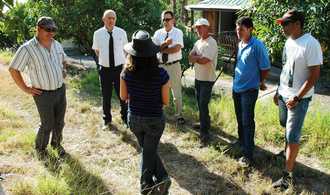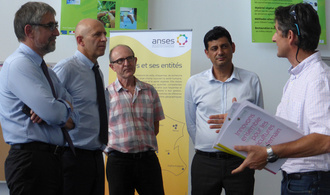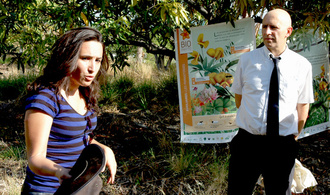Towards Ecophyto 2?
Written by Modified on the
The MP for Meurthe-et-Moselle, Dominique Potier, presented his report on Ecophyto entitled "Pesticides et agro-écologie - Les champs du possible".[1] The fruit of six months of meetings and visits, including a trip to Reunion Isalnd, the report aims to inspire a new Ecophyto program to substantially reduce the use of pesticides in France by 2025.
Launched in 2008 within the framework of the “Grenelle de l’Environnement”[2], the new Ecophyto plan aims to halve the use of pesticides in agriculture by 2018. Following the Inserm report on the effects of pesticides on health [3], Prime Minister Manuel Valls entrusted the MP Potier to assess Ecophyto in order to find new orientations for the future.
It is clear that halfway through the plan, the results are not up to initial expectations.
Overseas territories: “The vanguard of tropical agroecology"
The report notes new practices among both producers and consumers and offers 68 recommendations for Ecophyto “version 2”. The goal is to give new impetus to the agro-ecological pesticide management policy.
Two recommendations in particular concern overseas regions that put France, according to the report, "at the forefront of agro-ecology in tropical and island areas". With a "long tradition of scientific cooperation involving research partners in mainland France and overseas regions in around the world", institutions like CIRAD could, because of their long experience, contribute to the development of "innovative, adaptable and scalable methods" meant to be disseminate.
During their visit last November, Dominique Potier and Patrick Dehaumont, head of the Directorate General of Food (DGAL), were briefed on the project agenda for Reunion Island, on the various local actors and the current projects. Thus, when they visited the Plant Protection Platform in Saint-Pierre, our teams were able to question Dominique Potier and Jean-Jacques Vlody on the role that Reunion Island will play in developing innovative agroecological techniques.
Overcoming phytosanitary threats in the tropics
The report recommends that priority be given to overseas departments, particularly for "the implementation of a strategy to reduce phytosanitary deadlocks". Producers of specialized crops, especially fruits and vegetables, often lack certified technical solutions to protect their crops from common pests. These phytosanitary threats thus jeopardize many farms and industries, and undoubtedly act as a brake on economic development, particularly in French overseas territories. The report therefore recommends the establishment of a "simplified procedure for the rapid approval of safe alternatives to chemical control, adapted to overseas areas".
In addition, the report considers the current time it takes to make biocontrol products available to farmers is too long[4], slowing the implementation of new techniques and innovative processes, particularly as in tropical environments, it is "prevention is better than cure." As such, the French Agency for Food, Environmental and Occupational Health Safety ( ANSES) must accelerate progress and "facilitate and prioritize the testing, validation and promotion of emerging biocontrol solutions". Especially as Reunion Island already has local solutions which remain to be marketed, like the Coccinelle and Betel Réunion.
These biocontrol issues need to be part of a more comprehensive and coordinated approach, involving better organized R&D. Project management will be entrusted to CIRAD and INRA, in close contact with ANSES[5] as well as firms, supply chains and European actors.
Re-enforcing inter-DOM, European and international networks
The report also deems the "public dissemination of technical innovations and results of farmers’ trials" to be a crucial issue for overseas territories. It is essential that research comes up with the solutions to the difficulties faced by producers. Therefore, the report proposes to support RITA, the Réseaux d’Innovation et de Transfert Agricole (Agriculture Innovation and Transfer Networks) in their role as liaison between research and professionals. Research has been entrusted to ACTA and CIRAD, ensuring "the proactive participation of the various stakeholders, especially where producer organization is fragile”.
In addition, the report recommends strengthening these networks by developing inter-DOM exchanges around common themes, participating in European thematic networks in the framework of the European Innovation Partnership, and finally contributing to exchanges with producers in neighboring countries as part of international cooperation.
[1]
Read the "Pesticides et agro-écologie - Les champs du possible" report and its summary: www.dominiquepotier.com.
[2]
Launched in July 2007, the "Grenelle Environnement" brought together members of the French government and civil society to take long-term decisions for the environment and sustainable development. The report of preparatory work has been the basis for the establishment of a national sustainable development strategy based on three objectives: fight against global warming, conservation of biodiversity and pollution reduction.
[3]
The full report is available on the Inserm website: www.inserm.fr.
[4]
According to Article L.253-6 of the Rural Code, biocontrol agents and products are produced using natural mechanisms in the framework of integrated pest control and in particular: macro-organisms or plant protection products including micro-organisms, chemical mediators such as pheromones and kairomones and natural substances of plant, animal or mineral origin.
[5]
Anses will be in charge of issuing the Marketing Authorisations (MA) from July 2015.




